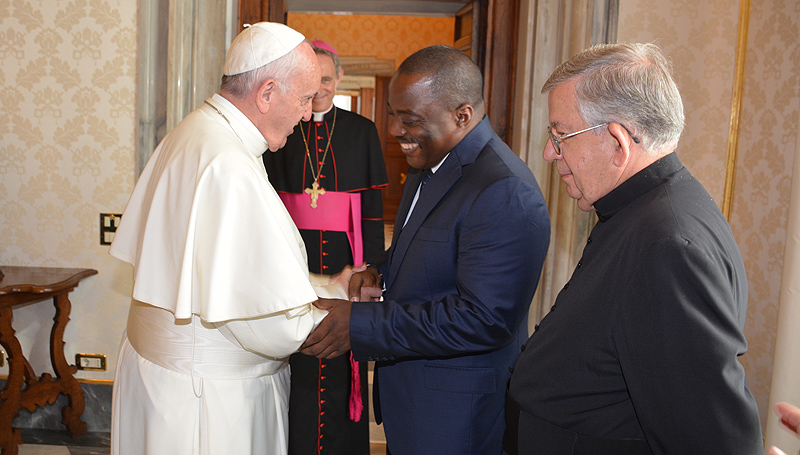
Kinshasa, DR Congo | AFP |
Fresh problems held up efforts by the Catholic Church to forge a deal on Saturday for ending the political crisis in Democratic Republic of Congo (DRC).
“The agreement is ready, but this morning all the groups came with new demands for details to be included in the accord,” said a church mediator who spoke on condition of anonymity.
After hours of talks, frustrated negotiators warned they could end their mediation if there were no breakthrough on Saturday.
The talks seek to resolve the future of President Joseph Kabila, who is holding onto power although his second and final five-year term ended on December 20.
Launched on December 8, the negotiations are taking place under the aegis of the influential Catholic Church, which had initially set Christmas Day as a deadline for a deal.
On Friday, the president of the Congo National Episcopal Conference (CENCO), Marcel Utembi, declared the two sides “are on the verge of concluding an accord.”
“The various delegates have reached agreement on the points where divergences lay,” he said, adding that the pact “is set to be signed tomorrow morning”.
The working document for the deal, seen by AFP, envisages a “political transition” with fresh presidential elections to be held at the end of 2017. A prime minister would come from opposition ranks.
The vote was supposed to be organised in 2016, before Kabila’s mandate ended this month.
The draft deal also guarantees that Kabila will not seek a third mandate and lays the groundwork for a “national transition council” charged with carrying out the agreement.
In return, the opposition headed by 84-year-old Etienne Tshisekedi would accept that Kabila can stay in power until he hands over to an elected successor. It had previously demanded his immediate departure from public life.
Sixteen representatives met on Saturday, comprising eight from the opposition coalition, called Rassemblement (“Gathering”), and eight from the government and groups which had signed a deal with the regime in October.
– Objections –
After six hours of talks, new stumbling blocks emerged.
The government side said it wanted the agreement to include giving Kabila the right to call a referendum on constitutional change during the transition period.
The opposition is completely opposed, arguing that Kabila will use this as a device to stay legally in office.
Communications Minister Lambert Mende, who is also the government’s spokesman, said “no faction… can deprive (the people) of its right to express its opinion through a referendum.”
Another dispute is over wording for the appointment of the prime minister — the government side want the individual to be “drawn from the opposition,” whereas Gathering want the premier to be “appointed by the opposition.”
The opposition side also want the deal to allow a wealthy businessman and potential presidential candidate, Moise Katumbi, to be allowed to return to the country.
Katumbi has been sentenced to a three-year term in prison in an alleged case of property fraud and faces another trial in an alleged case of mercenary recruitment.
– Poverty, chaos and corruption –
A vast and resource-rich country of 70 million people, but poor and chronically unstable, DR Congo has never witnessed a democratic transfer of power following polls since independence from Belgium in 1960.
Two decades ago, the country collapsed into the deadliest conflict in modern African history.
Its two wars in the late 1990s and early 2000s dragged in at least six African armies and left more than three million dead. Its restive east remains a battleground for rival ethnic militias.
Kabila, 45, has been in power since the 2001 assassination of his father Laurent at the height of the Second Congo War.
He was confirmed as leader in 2006 during the first free elections since independence from Belgium in 1960, and re-elected for a second term in 2011 in a vote marred by allegations of massive fraud.
He obtained a controversial court ruling in May 2016 stating that he could remain in power until a successor was chosen.
The deadline for his departure from office unleashed clashes that, according to UN figures, left at least 40 dead.
 The Independent Uganda: You get the Truth we Pay the Price
The Independent Uganda: You get the Truth we Pay the Price



